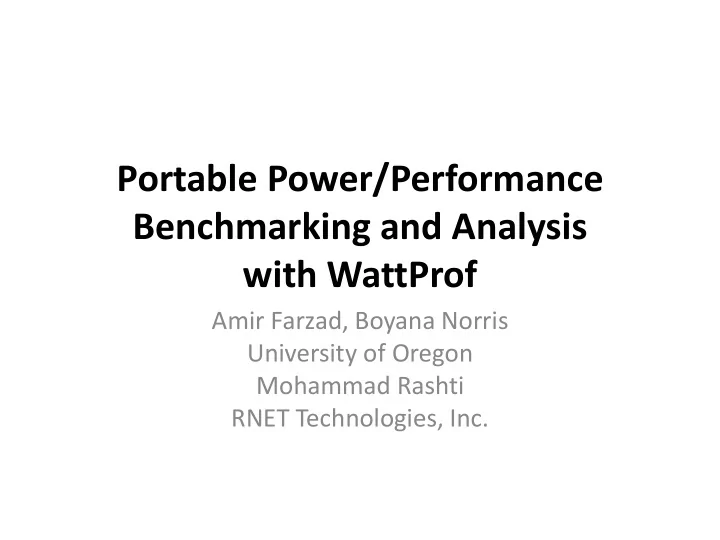

Portable Power/Performance Benchmarking and Analysis with WattProf Amir Farzad, Boyana Norris University of Oregon Mohammad Rashti RNET Technologies, Inc.
Motivation • Energy efficiency is becoming increasingly important in high-performance computing. • US DOE Goal: To build Exascale machine with 20MW max power by 2020. • With current trend on top500 * it takes 60 years! • Understanding the power attributes of application components. • Performance and power/energy of HPC apps. • Improving power/energy efficiency. • *http://www.top500.org/ 11/15/2015 2
Motivation Cont. • Hardware and software tools that enable fine- grained measurement of power. • Fine-Grain: Synchronize power/energy measurements with application activity. 11/15/2015 3
Our Contribution • Use of the new WattProf board [8] to collect fine-grained power and energy measurements. • Automated source code instrumentation of C/C++ and Fortran codes for collecting function-level power and energy measurements; • Power and energy analysis and modeling use cases based on this infrastructure. 11/15/2015 4
WattProf • WattProf (Rnet Tech. Inc.) , • a new power monitoring tool that enables high frequency (multiple kilohertz) direct power measurement • Different components: – CPU, DRAM, GPU, NIC, PCIe cards, fans, hard drives, SSD 11/15/2015 5
WattProf • WattProf (Rnet Tech. Inc.) , • more details ref. [8] in the paper • 4KHz sampling [8] M. Rashti, G. Sabin, and B. Norris. Power and energy analysis and modeling of high performance computing systems using WattProf. In Proceedings of the 2015 IEEE National Aerospace and Electronics Conference (NAECON), July 2015. 11/15/2015 6
Source Code Instrumentation • The WattProf host API can be used by application developers to measure power or energy consumption. • The granularity of the information that WattProf can gather is similar to performance tools such as PAPI , TAU , and HPC toolkit . But for power/energy . • Performance and power can be correlated for analysis and modeling. 11/15/2015 7
Source Code Instrumentation • The WattProf host API: – Starting and stopping a measurement window by calling the corresponding API functions. • Automatic instrumentation: – We developed a tool that instruments the source code for power and energy measurement. – Available on GitHub (https://github.com/amirfarzad/opensource) 11/15/2015 8
Source Code Instrumentation • Embeds the specific routines at the compile time in the target source code. • works with C , C++ and Fortran (GNU and Intel compilers). • Note that this option does not require any manual changes in the target source code. • Minimum overhead during measurement time: – Most of the post-processing is done before or after a measurement window 11/15/2015 9
Analysis • Initial evaluation on miniFE proxy app (the Mantevo benchmark suite). • miniFE – Problem size 30x30x30 to 150x150x150 – MPI processes 1,2,…,8 – GCC 4.8.2 with optimization levels -O0, -O1, -O2 and - O3 – Three runs and reporting the average value • We show how this platform can be effectively used for HPC application 11/15/2015 10
Power • Power for the problem size nx=150 • Prev. studies[6]: – the more aggressive optimization levels (-O3) may increase the power dissipation while they decrease the energy consumption due to shorter runtimes. [6] J. H. Laros, P. Pokorny, and D. DeBonis. PowerInsight{a commodity power measurement capability. In Green computing Conference (IGCC), 2013 International, pages 1-6, 2013. 11/15/2015 11
Power, Cont. • Figs. Separate for O0, O1, O2, O3. 11/15/2015 12
Energy Measurement • Compiler Flags: • O0>> • O3<O2 • O1? 11/15/2015 13
CPU efficiency • floating-point operations per Watt. • desirable to maximize the CPU efficiency. 11/15/2015 14
Profiling and Optimization • To demonstrate the ability of WattProf to profile the power of individual functions. • Fine grain resolution. Can be correlated with hardware performance counters for the same functions miniFE::mytimer() (O1 > O2 > O3), • miniFE::driver() (O1 < O2 < O3), • 11/15/2015 15
Modeling CPU energy • Modeling for -O3 • MPI p=1,2,…,8. • Nx =30,40,…,150. 11/15/2015 16
Modeling CPU energy 11/15/2015 17
Conclusion and Future Work • Fine-grained portable measurement infrastructure (WattProf card) can be used successfully for accurate measurement and analysis of realistic applications. • Modeling for CPU energy • new infrastructure aims to automate the data gathering, analysis and model-generation process for power and energy. • integrating power measurement and modeling in the Orio (http://brnorris03.github.io/Orio/)auto- tuning framework. 11/15/2015 18
? 11/15/2015 19
(Extra Slides) 11/15/2015 20
Top 500 11/15/2015 21
WattProf • The board can collect data for up to 128 sensors at up to 12KHz. • We set it to 4KHz to be safe for call stack (Software bottleneck) • Intel RAPL (Intel is just CPU and RAM). Model Based. Closed source. 11/15/2015 22
Machine Specs • We used the WattProf card on a machine with two Intel Xeon CPUs E5620 with 24GB memory • and running Ubuntu 14.04.2 with Linux kernel 3.13. We • considered problem sizes ranging from 30x30x30 to 150x150x150 • and different numbers of MPI processes ranging from 1 to • 8. We compiled the MPI-based miniFE with GCC 4.8.2 • with optimization levels -O0, -O1, -O2 and -O3 in order to study optimization on power and energy consumption. 11/15/2015 23
Energy Model and Time • Time and CPU energy are highly correlated (~97%) • Time is more predictable. Smoother curve. 11/15/2015 24
Energy Model and Time • Time and CPU energy are highly correlated • Time is more predictable. Smoother curve. 11/15/2015 25
Recommend
More recommend